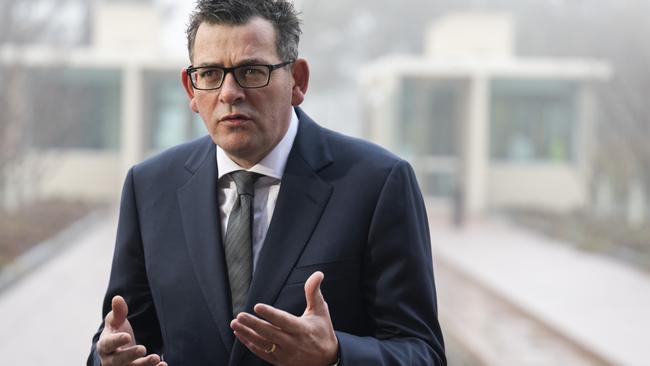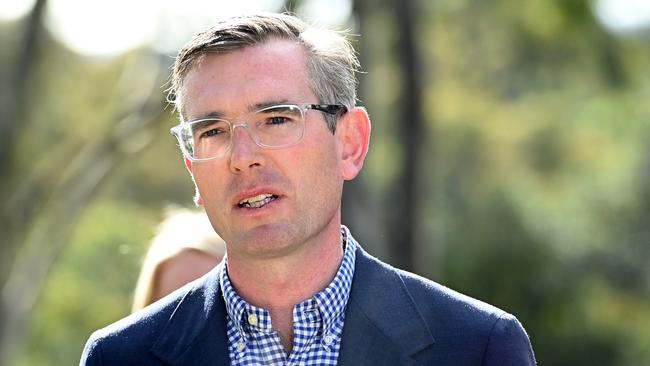Victoria holds title for state with biggest net debt
Victoria has earnt another grim title as its debt continues to soar, sparking renewed calls for an overhaul of the state’s property tax.
Victoria
Don't miss out on the headlines from Victoria. Followed categories will be added to My News.
Victoria’s net debt will remain billions above any other state in Australia even after NSW’s levels were revised to be nearly double what was estimated.
The NSW budget revealed on Tuesday that the state was expected to hit $114.8bn by 2025-26, compared to $167.5bn for Victoria in the same time period. Both states are the nation’s biggest economies but Victoria endured the world’s longest combined pandemic lockdown.
Victoria’s debt will also make up a greater share of its gross state product than its northern neighbour.
Debt will be 26.5 per cent of our GSP in four years while NSW is forecast to be 13.7 per cent.
NSW Treasurer Matt Kean justified his government’s spending on Tuesday by taking aim at Victoria’s precarious position under Premier Dan Andrews.

“Our net debt to GSP ratio is half that of Victoria and we are building double the amount of infrastructure in NSW.”
When approached about Mr Kean’s comment, the Victorian state government rejected this claim and defended itself by pointing to its building agenda.
NSW’s infrastructure investment over the four years from 2022-23 is $112.7bn, while Victoria’s is $85.3bn. The northern state also has a larger population, bringing the two more in line on a per capita basis.
“Our unprecedented infrastructure program has supported more than 190,000 jobs and is forecast to average more than $21bn annually over the next four years,” a Victorian government spokesman said. “That’s four times the average rate in the 10 years prior to the government taking office.”
But independent economist Saul Eslake said that Mr Kean’s criticisms of Victoria had merit.
“As with household mortgages, it is not so much the level of debt as the capacity to service it that matters,” he said.
“The share of its revenue that Victoria will be applying to interest payments is forecast to rise from 3 to 6.1 per cent, compared to NSW which says it is going from 2.2 to 4.9 per cent.
“The point is Victoria’s budget is now more than a month old and interest rates have gone up a lot over that period.
“Victoria’s interest will rise by more than what was forecast and that will mean that Victoria will be spending more of its revenue on interest than any other state, not just NSW but the Northern Territory as well which generally has the worst finances.”
Victoria is also forecast to run operating deficits averaging 1.1 per cent of GSP over five years while NSW’s is 0.8 per cent.
“State governments like to talk about operating deficits by which they mean revenue minus spending on everything except infrastructure,” Mr Eslake said.
“It’s not just infrastructure, it’s also the operating part of Victoria’s budget that is in worse shape.”
He said eventually, after the state election, higher taxes would have to be considered.
“After that, whoever is in government will have to think about it because of the higher level of debt and bigger deficits,” Mr Eslake said.
“And particularly Victoria is more vulnerable to the increase in interest rates we’re having.”
VIC URGED TO FOLLOW NSW TAX REFORMS
Victoria has been encouraged to follow NSW in reforming stamp duty after the northern state announced major changes for first-home buyers.
NSW Treasurer Matt Kean on Tuesday revealed a proposal giving first-home buyers the option to pay an annual property tax instead of the expensive duty as part his state budget.
The measure would give such buyers the option of paying an annual land tax on a property pegged at $400 plus 0.3 per cent of land value.
It would be available for homes priced at up to $1.5m.
State treasurers have for years canvassed reforms to the current tax system, with stamp duty a major source of revenue but wedded to the vagaries of the property market.
Victoria was understood to be considering changes in 2020 but has so far only chosen to waive stamp duty for first-home purchases under $600,000.
The Andrews government has maintained there is no plan to revise the stamp duty system but remains open to examining the tax mix.

Property Council of Australia Victorian executive director Danni Hunter said Victoria needed a review into the tax system before the state heads to a November election. This would include reviewing whether stamp duty and land tax were fit for purpose.
“Are these taxes a handbrake on economic growth?” Ms Hunter said.
“The community is looking to our policymakers and leaders, who have a responsibility to consider what a better tax system for Victorians could look like – one that grows the economy and does not limit its potential.”
Ms Hunter said many economists agreed stamp duty was harmful and discouraged economic activity.
She said work was needed to convince the state’s policymakers but the economic climate provided an ideal opportunity for review.
Victoria is forecasting a 4 per cent drop in home prices across 2023 as Melbourne’s hot property market cools off.
The biggest change in values was expected to be in high-end properties. Because of this, stamp duty revenue in Victoria is expected to hit $10.2bn this financial year before dropping to $8.2bn in 2022-23.
It will then increase by about 2 per cent year on year.
“What we’re doing is making it as easy as possible for people to enter the housing market,” Mr Kean said.
But he said “widescale” stamp duty reform to gradually introduce a property tax for all buyers will not be possible without “significant investment from the commonwealth”.
Legislation required to implement the change will be introduced later this year.
NSW Labor is poised to oppose the move, with leader Chris Minns declaring his party would “never support” a proposal to impose a “never-ending land tax, particularly on first-home buyers”.




